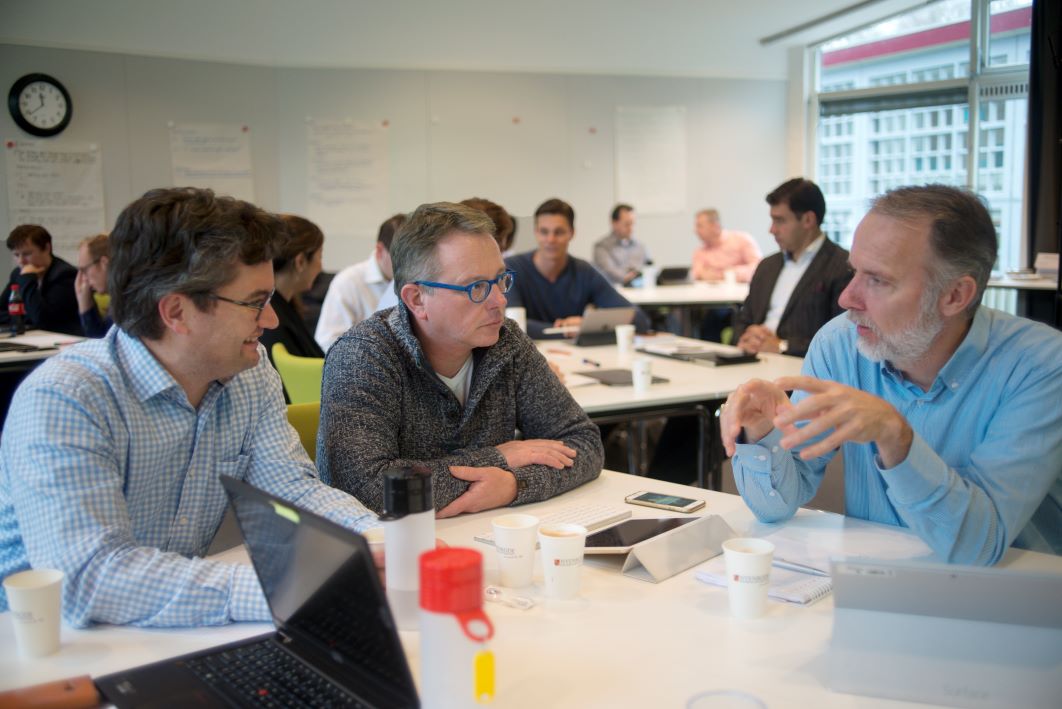- Prof. dr. Bas Kodden LL.M.
- Prof. dr. Pascale Peters
“We now work massively from home, but working from home these days is quite different from once in a while working from home.’ Nowadays, the whole family is at home and needs our attention. The challenge is to adapt work processes in such a way that they can be carried out from a distance, without affecting the (mental) health of employees. This requires flexibility and trust from employers and requires good technological solutions. That turnaround has taken place at quickly as possible in the recent weeks.”
Core task is vitality
Good leadership as well as making the right choices are equally important in this. “As a manager you really need to focus on your core task: keeping your organization or team running”, says leadership coach Bas Kodden, who is also an associate professor and the director of the Executive MBA program at the same university. “It’s all about survival. Not only the future of your employees but also the well-being of your company is at stake. If safety and results fall back, you as a manager need to take more leadership, keep your head cool and keep the peace to ensure the continuity of your company. Be aware: we are only at the beginning of this crisis and the real blow for businesses has yet to come. In addition to short-term action, a (medium) long term strategy is of great importance. How much loss of turnover do I have to take into account? How can I adjust my costs?

Forms of control
According to Kodden, there are four ways to manage your team in crises like this, the so-called management controls (Merchant & Van der Stede, 2017). “First of all, Personnel Control: Finding and keeping the right people. The second is Cultural Control, creating the right team culture. By Action Control, everything is closely monitored by the manager. Finally, there is Result Control. This is based on trust in which you maintain levels of freedom, as long as the right results are achieved”.
“It’s very tempting right now for managers to start micromanaging from the Action Control perspective.” But according to Peters and Kodden that is counterproductive. “As a leader, set clear and perhaps new goals, and give direction,” says Peters. “Trust, however, that your people are motivated to work for you. As a leader, it is not your job to have everything under tight control right now, no matter how tempting that may be.”
Kodden adds: “Provide energy, ownership and a sense of togetherness. Inspire and motivate your employees and from there monitor the short- and medium-term goals that have been set and communicate about the situation that has arisen (Cultural Control). In this way you can give direction, offer space and ask for results (Result Control). When I was an entrepreneur myself and ended up in my first major crisis, I thought I could not show any vulnerability because it would potentially paralyze my employees. The opposite turned out to be true. They started working harder from intrinsic motivation when I became transparent about the situation we were in. Stubbornness and vulnerability go hand in hand.”
Social cohesion
Peters and Kodden agree that leaders should focus more on Cultural and Result Control. “We are now realizing how enormously important this social cohesion is,” says Peters. “If you achieve the right culture of collaboration and performance, people are and will remain more proactive. Instead of waiting, they will take initiatives and come up with creative solutions. This is what we must continue to focus on in the future,” says Peters.
Peters concludes with three tips for working from home in the Netherlands: 1. Pay attention to your colleagues. 2. Help each other 3. Trust each other. Kodden adds: "Keep your triggers under control; fear, ego and too much empathy. We all have those little devils in us. Empathy is good, but do not lose sight of your ultimate task, which is your productivity and therefore business continuity. All employees depend on it.”
Tags
Related programs
-
Impact MBA
Start date: March and September 2025Language:- English
Location:- Amsterdam
- Breukelen
With Impact MBA you become a leader fit for a sustainable and technological future.
View program
-
Cooperation and Leadership
Start date: September 10, 2025Language:- Dutch
Location:- Breukelen
This module is only given in Dutch. Please visit our Dutch site.
View program
-
Impact MBA Executive
Start date: March 2026Language:- English
Location:- Breukelen
A two-year part-time boost for your personal leadership development.
View program
-
Impact MBA Full-time
Start date: September 2026Language:- English
Location:- Breukelen
A one-year full-time accelerator for your career in the Netherlands and abroad.
View program
-
Master in Management (MSc) | Full-time
Start date: August 2026Language:- English
Location:- Amsterdam
- Breukelen
16-month full-time program designed to develop academic and professional skills. With a strong focus on practical business knowledge, Nyenrode prepares students for global careers while fostering personal growth.
View program
-
Cooperation and Leadership
Start date: March 4th 2026Language:- Dutch
Location:- Breukelen
This module is only given in Dutch. Please visit our Dutch site.
View program
